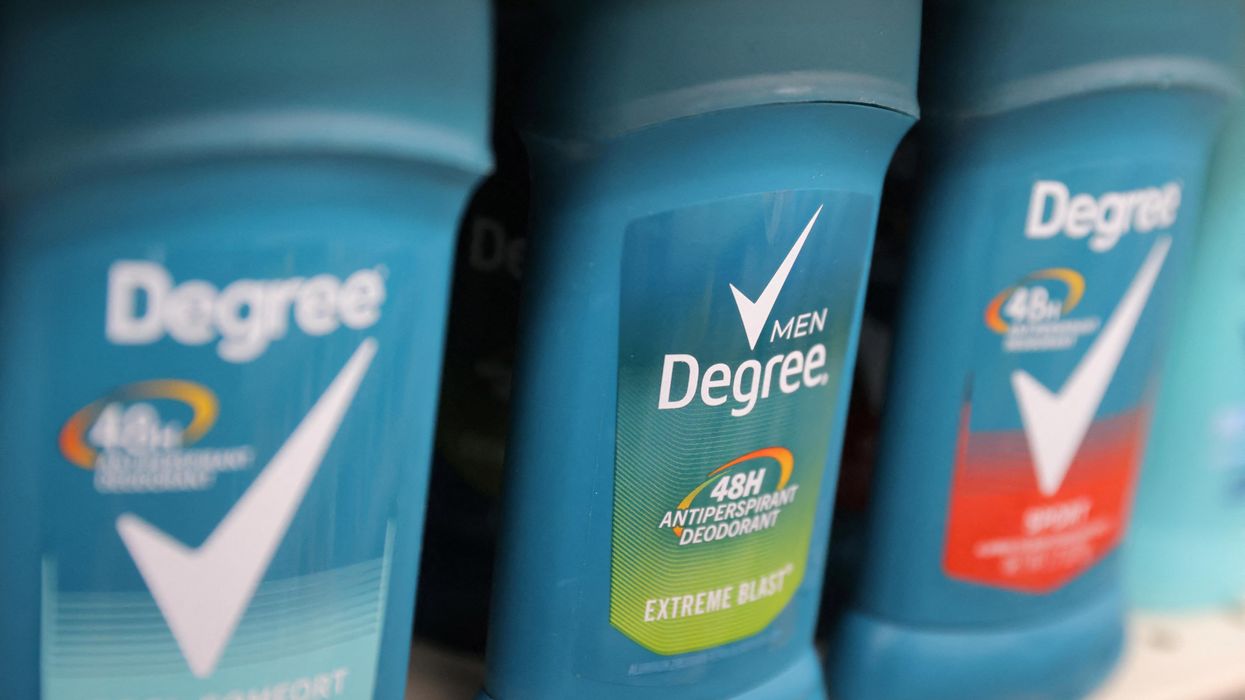The Current, delivered daily.
LONDON (Reuters) - As commodities - from crude oil to sunflower oil - remain in short supply, Britain's Unilever has changed the ingredient makeup for some of its products like deodorants and packaged food to cut costs and mitigate supply constraints.
The ability to switch ingredients and materials, something consumer goods manufacturers traditionally find difficult, became even more valuable after Russia's invasion of Ukraine led to commodity prices hitting multi-year highs.
In April, Unilever boss Alan Jope said the company had begun altering some of its recipes so it could use rapeseeed oil instead of sunflower oil, which had become scarce since the invasion. Ukraine typically produces about half the world's exports of sunflower oil.
According to Unilever's head of research and development, Richard Slater, the maker of Dove soap and Knorr stock cubes is not stopping there.
"Globally, there was a shortage of silicon so we were looking at our deodorant and making sure that we looked at the formulations there...to use less ingredients that are under pressure," Slater said in an interview.
Unilever, which makes Rexona, Dove, Axe and Lynx deodorants, dealt with this issue last year, he said. In its home and beauty care businesses, the company has also been trying to reduce its products' reliance on petrochemicals and make them more sustainable.
"That has a double benefit if you can get a better product that is more sustainable, but also reduce the pressure on some of those ingredients under cost pressure," Slater said.
Many packaged goods makers have tried to wean themselves off palm oil, which has been blamed for deforestation and labor abuses, but is used in everything from P&G's Tide pods to Ferrero's Nutella.
On Thursday, Unilever said it had tied up with San Diego-based Genomatica to build and commercialize alternatives to palm oil and fossil fuel-derived cleansing ingredients.
"We're not talking about a few thousand tonnes here, we are talking meaningful commercial scale," Slater said, declining to provide details about how much of the new ingredient it plans to produce in the near term.
Sourcing alternatives to palm is also "really important from a supply resilience point of view" due to the pricing around the commodity, Slater added.
Unilever no longer relies solely on manual testing when it changes its formulas. Instead, it digitally models how new ingredients would affect products, Slater said.
For instance, he added, as it alters recipes for shampoos, the company uses robots to try dozens of differently modeled potential products on hair in a matter of hours.
(Reporting by Richa Naidu; Editing by Matt Scuffham and Deepa Babington)
Trending in Economy
'There's a lot of ways to frame value'
Campbell Soup Company CEO Mark Clouse offered thoughts on messaging amid inflationary shifts in consumer behavior.
After months of elevated inflation and interest rate hikes that have the potential to cool demand, consumers are showing more signs of shifting behavior.
It’s showing up in retail sales data, but there’s also evidence in the observations of the brands responsible for grocery store staples.
The latest example came this week from Campbell Soup Company. CEO Mark Clouse told analysts that the consumer continues to be “resilient” despite continued price increases on food, but found that “consumers are beginning to feel that pressure” as time goes on.
This shows up in the categories they are buying. Overall, Clouse said Campbell sees a shift toward shelf-stable items, and away from more expensive prepared foods.
There is also change in when they make purchases. People are buying more at the beginning of the month. That’s because they are stretching paychecks as long as possible.
These shifts change how the company is communicating with consumers.
Clouse said the changes in behavior are an opportunity to “focus on value within our messaging without necessarily having to chase pricing all the way down.”
“No question that it's important that we protect affordability and that we make that relevant in the categories that we're in," Clouse said. "But I also think there's a lot of ways to frame value in different ways, right?”
A meal cooked with condensed soup may be cheaper than picking up a frozen item or ordering out. Consumers just need a reminder. Even within Campbell’s own portfolio, the company can elevate brands that have more value now, even if they may not always get the limelight.
The open question is whether the shift in behavior will begin to show up in the results of the companies that have raised prices. Campbell’s overall net sales grew 5% for the quarter ended April 30, while gross profit margins held steady around 30%. But the category-level results were more uneven. U.S. soup sales declined 11%, though the company said that was owed to comparisons with the quarter when supply chains reopened a year ago and expressed confidence that the category is seeing a longer-term resurgence as more people cook at home following the pandemic. Snacks, which includes Goldfish and Pepperidge Farm, were up 12% And while net sales increased overall, the amount of products people are buying is declining. Volumes were down 7%.
These are trends happening across the grocery store. Campbell is continuing to compete. It is leading with iconic brands, and a host of different ways to consume them. It is following that up with innovation that makes the products stand out. Then, it is driving home messaging that shows consumers how to fit the products into their lives, and even their tightening spending plans.
Campbell Soup is more than 150 years old, and has seen plenty of difficult economic environments. It is also a different business today, and will continue to evolve. At the end of the day, continued execution is what’s required.
“If it's good food, people are going to buy it, especially if it's a great value,” Clouse said.










